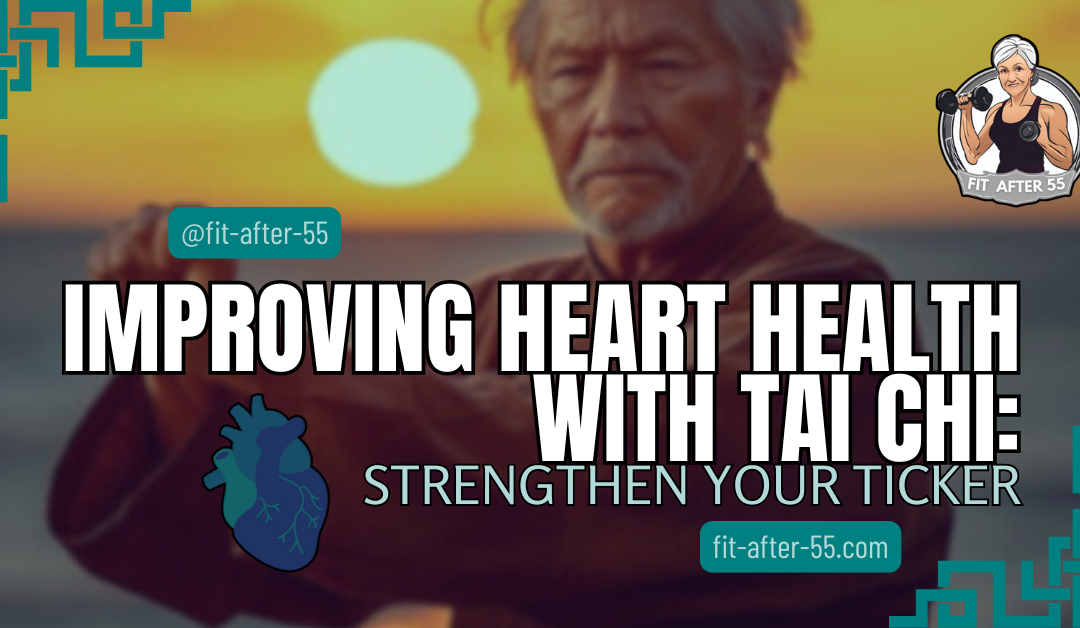Improving heart health with Tai Chi offers a gentle yet powerful way to strengthen your ticker while enhancing overall well-being. This ancient Chinese practice combines slow, deliberate movements with deep breathing, creating a harmonious flow that benefits both the body and mind. Unlike high-intensity workouts, Tai Chi is low-impact and suitable for people of all ages and fitness levels. It is an ideal option for those looking to improve cardiovascular health without placing undue strain on the heart. Its calming nature helps regulate blood pressure and reduces stress—two crucial factors in maintaining a healthy heart.
You can enjoy many heart-related benefits by incorporating Tai Chi into your routine. This practice touches on key aspects of holistic health, from boosting circulation and improving balance to promoting relaxation and mental clarity. Whether recovering from heart issues, trying to prevent them, or simply seeking a gentle way to stay active, Tai Chi offers a sustainable path to better heart health. Ready to dive in and strengthen your heart through mindful movement? Let’s explore how Tai Chi can transform cardiovascular fitness and help you lead a more balanced, heart-healthy life.
Improving Heart Health with Tai Chi: Gentle Moves for a Stronger Ticker

Looking for a gentle way to boost your heart health? Taichi might be just what you need. This ancient Chinese practice combines slow, flowing movements with deep breathing and meditation. Tai chi can lower blood pressure as much as or more than aerobic exercise, making it a great choice for improving heart health.
Tai chi isn’t just for older adults. Anyone can benefit from its calming effects and heart-healthy perks. It’s easy on your joints and can be done almost anywhere. You don’t need special equipment or a gym membership to get started. Want to give your heart some love? Taichi could be your new go-to workout. It’s been shown to reduce stress, ease depression, and improve balance. These benefits all add up to a healthier heart and a happier you.
Key Takeaways
- Tai chi can lower blood pressure and improve heart health through gentle movements.
- You can practice tai chi anywhere without special equipment.
- Regular tai chi may reduce stress and boost mood, supporting overall heart health.

Understanding Tai Chi
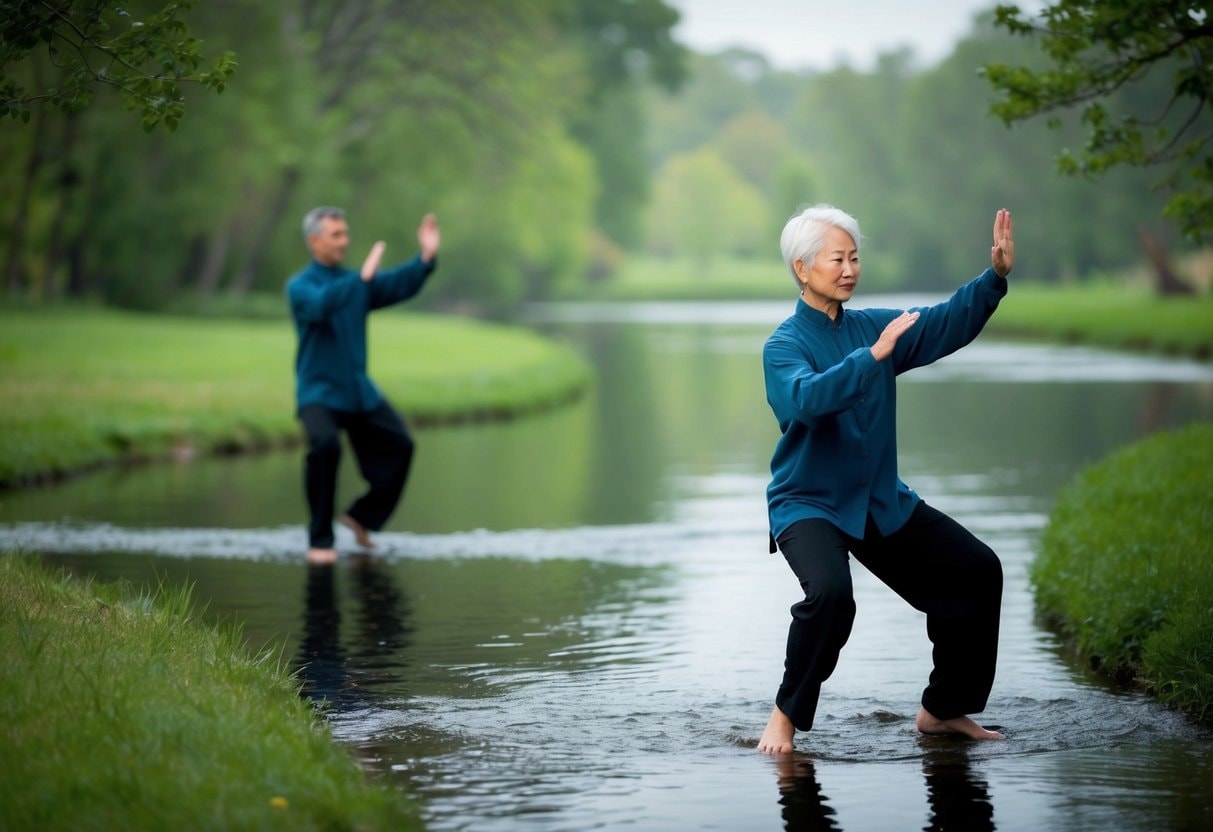
Tai Chi is an ancient Chinese practice that combines gentle movements with breathing and focus. It offers many health benefits and can be practiced by people of all ages and fitness levels.
Origins and Philosophy
Tai Chi started in China hundreds of years ago. It began as a martial art but grew into a practice for health and well-being. The main idea behind Tai Chi is balance – in your body and your life. Tai Chi is based on the concept of Qi, which means life energy. The goal is to help this energy flow smoothly through your body. You try to find harmony between your mind and body when you do Tai Chi.
Tai Chi Forms and Practices
When you start Tai Chi, you’ll learn different forms. These are sets of slow, flowing movements you do in a specific order. Some common forms are:
- Yang Style: The most popular, with wide, slow movements.
- Chen Style: More martial arts-like, with some fast moves.
- Wu Style: Focuses on small, compact movements.
You’ll also practice breathing exercises and meditation. These help you relax and focus your mind.

The Relationship Between Qi and Tai Chi
Qi is at the heart of Tai Chi. It’s believed to be the life force that flows through your body. When you practice Tai Chi, you’re working to balance and improve the flow of Qi. The movements in Tai Chi are designed to remove blockages and help Qi move freely.
This is thought to improve your health and well-being. Focusing on your breathing and movements makes you more aware of your body and its energy. Many people find that regular Tai Chi practice helps them feel energized and balanced daily.
Health Benefits of Tai Chi
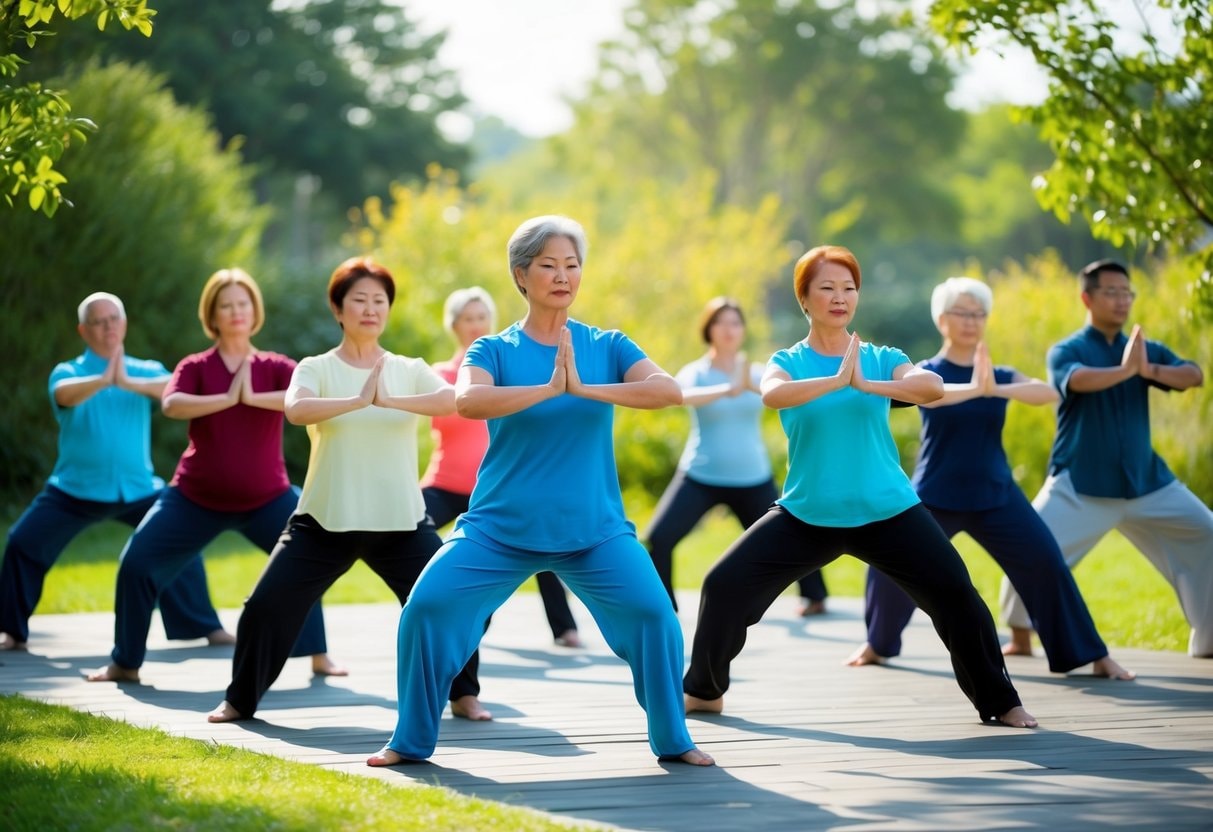
Improving Heart Health With Tai Chi offers many benefits to enhance overall well-being. This gentle exercise can boost your heart health, lower blood pressure, reduce stress, and improve physical strength and balance.
Cardiovascular Health Improvements
Tai chi can do wonders for your heart. Regular practice may improve your cardiovascular fitness, even though it’s a low-impact exercise. You’ll find your heart getting stronger with each session. The slow, controlled movements increase blood flow throughout your body. This helps your heart work more efficiently. As you practice, you might notice:
- Improved heart rate.
- Better circulation.
- Reduced risk of heart disease.
Tai chi is especially helpful if you’re recovering from a heart attack or dealing with heart failure. It’s a safe way to get moving and strengthen your heart.
Amelioration of Blood Pressure
High blood pressure can be a silent killer, but tai chi might be your new secret weapon. This ancient practice can help lower your blood pressure, reducing strain on your heart and blood vessels. How does it work? The combination of gentle movement and deep breathing:
- Relaxes your blood vessels.
- Reduces stress hormones.
- Improves blood flow.
You might notice a noticeable drop in your blood pressure readings after a few weeks of regular practice. It’s a natural, medication-free way to keep your numbers in check.
Stress Reduction and Mental Health
Feeling overwhelmed? Tai chi could be your ticket to a calmer mind. This meditative practice helps you focus on the present moment, easing anxiety and stress. As you move through the poses, you’ll find:
- Your mind becomes clearer.
- Worries start to fade.
- A sense of peace washes over you.
Tai chi can boost your mood and even help with depression. The slow, mindful movements increase feel-good chemicals in your brain. You’ll likely notice improved sleep and a more positive outlook on life.
Enhancing Muscle Strength and Flexibility
Don’t let tai chi’s gentle nature fool you – it’s a great workout for your muscles. You build strength without straining your joints as you hold poses and flow through movements. Tai chi can improve both your lower-body and upper-body strength. You’ll notice:
- Stronger legs and core.
- Improved arm and shoulder strength.
- Increased flexibility throughout your body.
The slow, controlled movements help lengthen your muscles and improve your range of motion. This can make everyday tasks easier and reduce your risk of injury.
Augmenting Balance and Coordination
Worried about falls? Tai chi is an excellent way to improve your balance and coordination. The practiced, deliberate movements train your body to be more stable. You’ll learn to:
- Shift your weight smoothly.
- Maintain better posture.
- React quickly to prevent falls.
Tai chi is especially beneficial for older adults, but people of all ages can enjoy improved balance. As you practice, you’ll feel more confident in your movements during exercise and daily life.

Did You Know?
Tai chi can fit easily into your life and boost your heart health. You can practice it at home or join group classes to make new friends. Add 10-15 minutes of tai chi to your morning routine. This gentle movement helps your heart and sets a calm tone for your day. Try replacing one of your weekly workouts with a tai chi session. It’s a great, low-impact option that still counts as physical activity. You can even do tai chi during TV commercial breaks!
Watch this video on Enhancing Heart Health and Preventing Heart Disease.
By: Taichi Zidong
Tai Chi for Heart Disease

Improving heart health with Tai Chi offers many benefits for people with heart problems. This gentle exercise can help recover, manage symptoms, and prevent future issues.
Tai Chi in Cardiac Rehabilitation
Tai chi is a great option for cardiac rehabilitation. It’s gentle and easy to adapt to your needs. You can start slowly and build up your strength over time. The flowing movements help improve your balance and flexibility.
This is key for getting back on your feet after a heart attack. Tai chi also helps reduce stress. Less stress means a healthier heart. You’ll learn to breathe deeply and focus your mind. This can lower your blood pressure and heart rate.
Managing Heart Failure with Tai Chi
If you have heart failure, tai chi can make a big difference. It’s a safe way to get moving without putting too much strain on your heart. Tai chi can boost your mood if you’re feeling down. Many people with heart failure deal with depression.
The calm, focused nature of tai chi helps lift your spirits. Regular practice can also improve your heart function. You might find you can do more daily tasks with less tiredness. Tai chi also helps you sleep better, which is important for heart health.
Preventing Heart-Related Conditions
Tai chi isn’t just for those who already have heart problems. It’s great for prevention, too. Regular practice can lower your risk of developing heart disease. The gentle movements help control blood pressure. High blood pressure is a major risk factor for heart disease.
Tai chi works as well as aerobic exercise for this. You’ll also improve your overall fitness. This helps keep your weight in check, another key to heart health. Plus, the social aspect of group classes can boost your mood and motivate you.
Practical Aspects of Tai Chi Practice
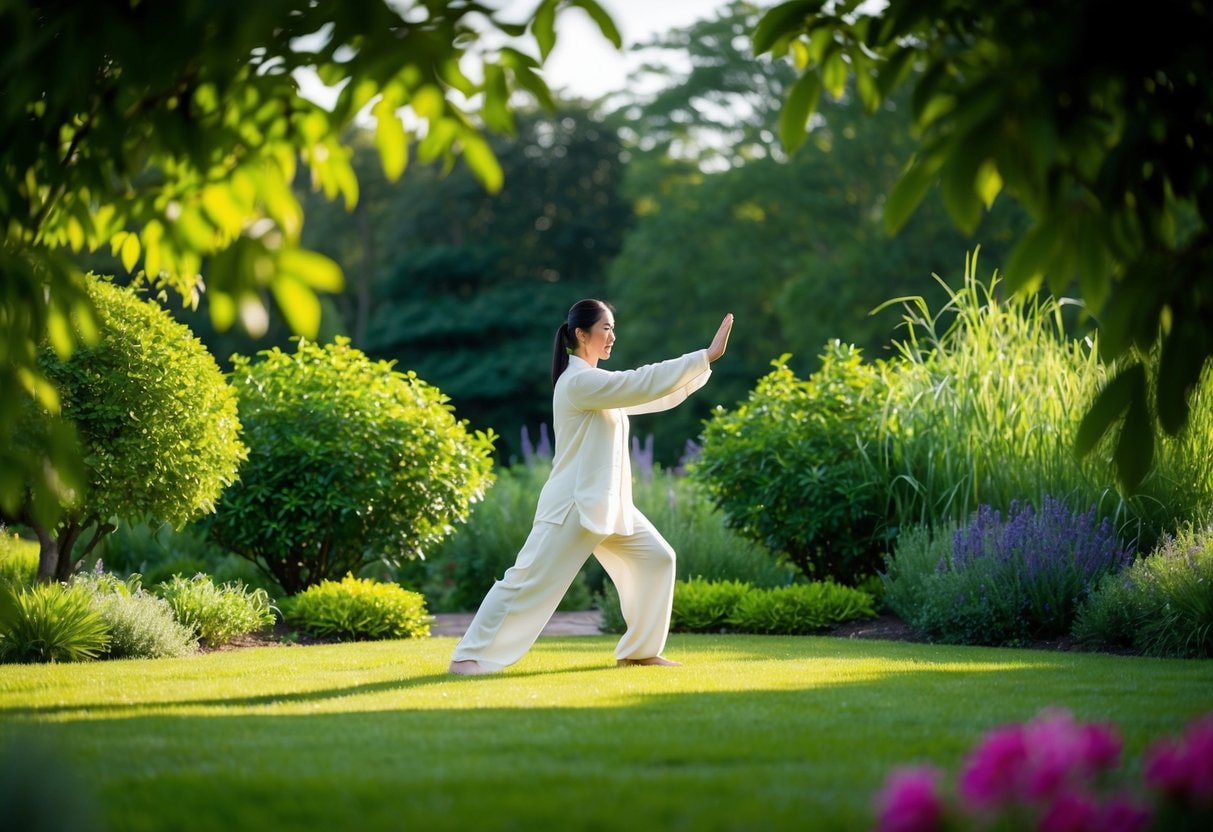
Improving heart health with Tai Chi is easy to start and can fit into your daily routine. You don’t need special gear or a lot of space. Here’s how to begin your Tai Chi journey.
Getting Started with Tai Chi
You can start tai chi at home or in a class. Wear comfy clothes that let you move freely. Loose pants and a T-shirt work well. You don’t need shoes – many people do tai chi in socks or barefoot. Begin with basic moves. Learn the tai chi stance and how to shift your weight. Focus on your breathing and try to relax.
Don’t worry about getting it perfect at first. Tai chi is about smooth, slow moves. It’s often called “meditation in motion” because it helps calm your mind. Try to practice for 10-15 minutes daily. As you get better, you can do longer sessions.
Choosing the Right Tai Chi Class
Look for classes at community centers, gyms, or parks. Some hospitals even offer tai chi for heart health. Pick a class that fits your needs:
- Beginner classes for new learners.
- Gentle tai chi if you have health issues.
- More active styles if you want a challenge.
Watch a class before you join. See if the teacher’s style works for you. Ask about their training and experience. Don’t be shy about trying different classes. Each teacher has their approach. Find one that makes you feel comfy and excited to learn.
Tips for Effective Practice
Be patient with yourself. Tai chi takes time to learn. Focus on how it makes you feel, not on doing it perfectly. Set a regular practice time. Even 10 minutes a day can help. Morning practice can energize you for the day. Use online videos when you can’t get to class. But be careful to follow proper form to avoid injury. Try these tips for better practice:
- Stand with your feet shoulder-width apart.
- Keep your knees slightly bent.
- Relax your shoulders and arms.
- Breathe deeply and slowly.
- Move gently and smoothly.
Remember, tai chi is not just exercise. It’s also about mindfulness. Pay attention to your body and breath as you move.
Improving Heart Health With Tai Chi: Tai Chi for Different Populations
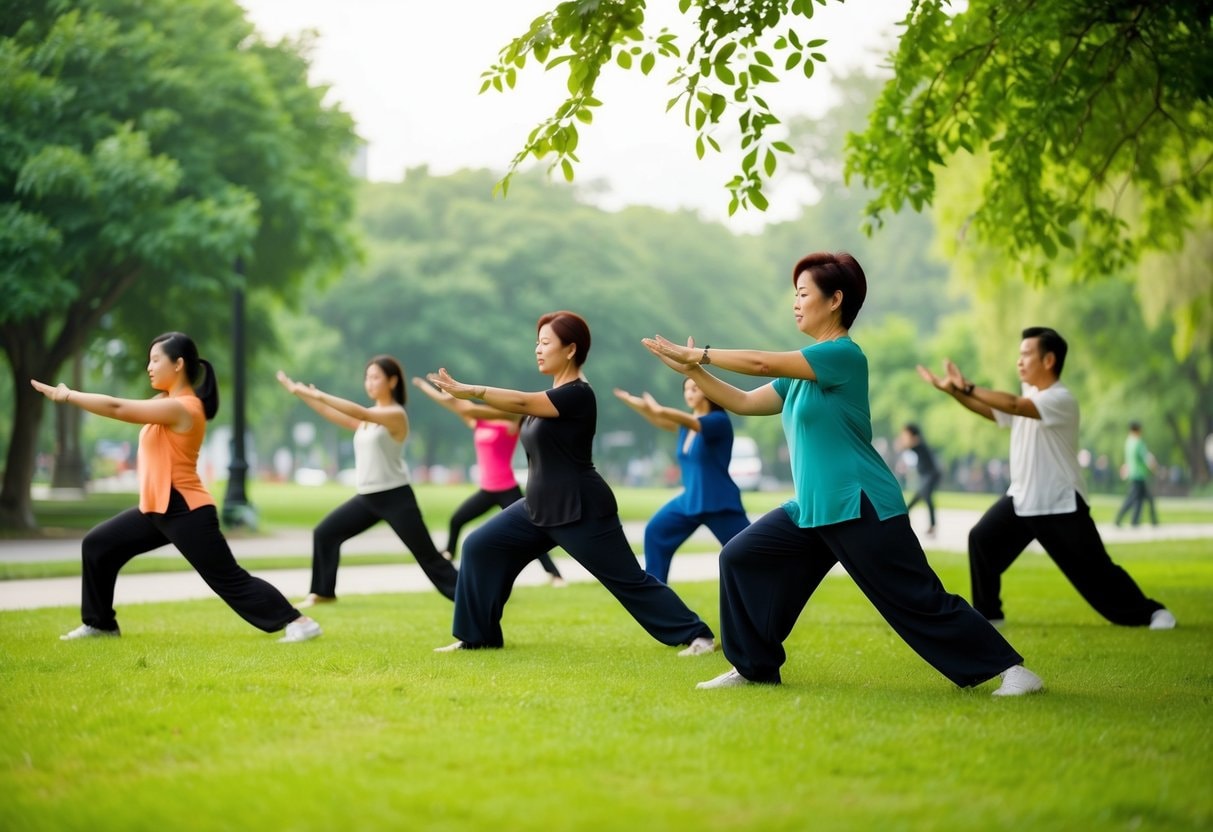
Tai Chi offers unique benefits for various groups. It can be adapted to suit different needs and abilities, making it an excellent choice for improving health.
Tai Chi for Older Adults
Tai Chi can be a great way to stay active and healthy as you age. This gentle exercise is suitable for elderly people. It can also help if you’re dealing with obesity or other health issues. Tai Chi can help you:
- Improve your balance.
- Reduce your risk of falls.
- Boost your heart and lung function.
You don’t need special equipment or a gym membership. You can practice Tai Chi at home or in a park. It’s a low-impact exercise that’s easy on your joints. Tai Chi may also help you lower your blood pressure and lose weight. This can reduce your risk of heart disease and other chronic conditions.
Tai Chi for Rehabilitation
If you’re recovering from a heart attack or dealing with heart failure, Tai Chi might be just what you need. It’s a promising exercise option for heart patients. Tai Chi can help you:
- Increase your physical activity levels.
- Improve your fitness.
- Enhance your quality of life.
The slow, controlled movements of Tai Chi are perfect for rehabilitation. They allow you to build strength and flexibility at your own pace. Tai Chi combines physical movement with breathing exercises and mental focus.
This holistic approach can support your recovery process, both physically and mentally. Always consult your doctor before starting any new exercise program, especially if you’re in rehabilitation.
Research and Evidence
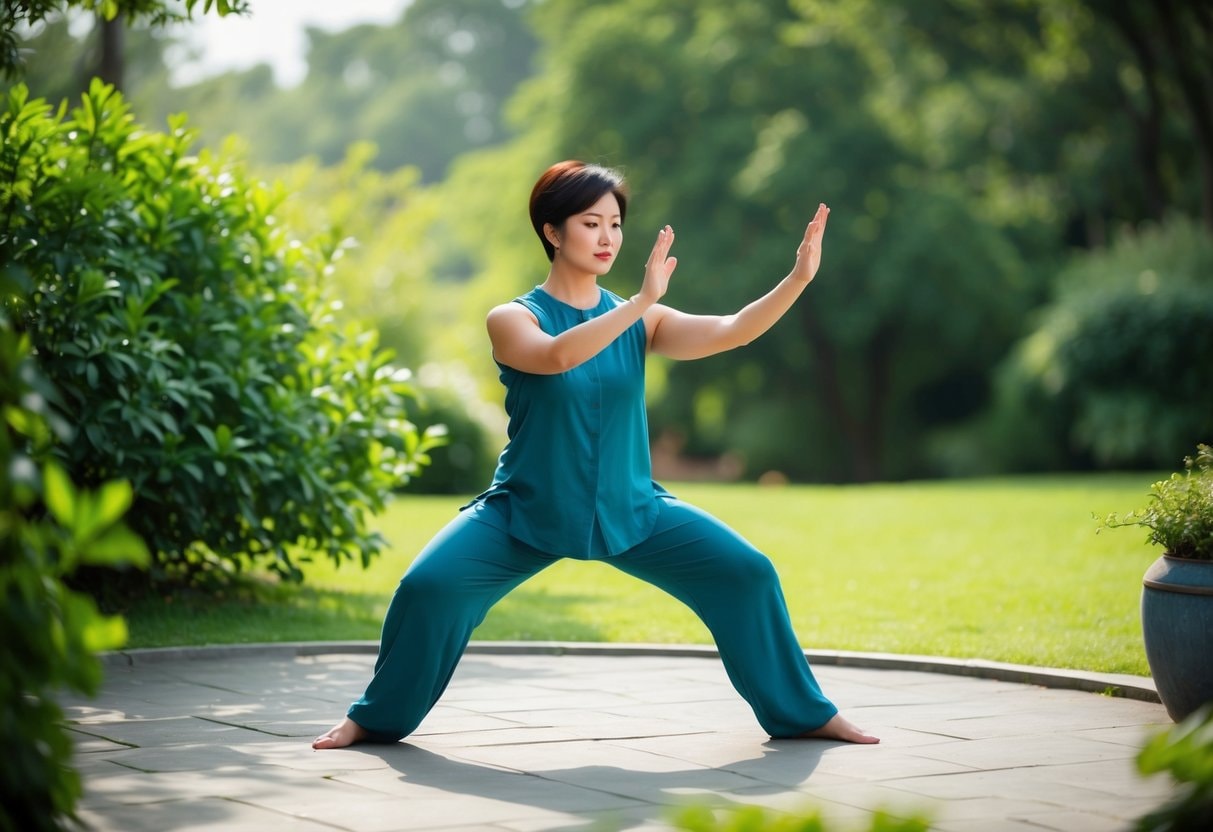
Improving heart health with Tai Chi shows great promise. Studies have found benefits for key markers like blood pressure and cholesterol. Let’s explore the research findings and the measurable health improvements.
Studies on Tai Chi and Heart Health
Research on Tai Chi shows it can help people with heart failure. In one study, Tai Chi improved exercise ability in patients. It also made them feel better overall. You might see benefits for preventing heart disease, too.
Some studies found that tai chi affects proteins linked to heart health. This may explain how it helps your heart. Tai Chi seems to work in different ways. It can lower stress, improve blood flow, and strengthen your heart. These effects add up to better heart function.
Statistical Improvements in Health Markers
You may see real changes in your health numbers when you practice Tai Chi regularly. Here are some improvements found in studies:
- Blood Pressure: Can drop by 5-10 points.
- Cholesterol: May lower bad cholesterol by 5-10%.
- Weight: Some people lose 2-4 pounds.
- Waist Size: Can shrink by 1-2 inches.
Research shows that tai chi helps with high blood pressure. It might even lower your risk of stroke. Your body mass index (BMI) could go down too. These changes happen slowly over time. You’ll get the most benefit if you keep practicing Tai Chi regularly.
Take a look at this video featuring Tai Chi for Heart Health.
By: Taichi Zidong
Embracing Tai Chi for a Healthier Heart and Balanced Life
Incorporating Tai Chi into your routine can significantly enhance heart health by combining gentle movements with mindful breathing. This ancient practice offers a low-impact way to boost cardiovascular fitness, making it ideal for people of all ages and fitness levels. Tai Chi promotes better circulation, helps regulate blood pressure, and reduces stress—key factors in maintaining a healthy heart. Additionally, its calming nature supports mental well-being, offering a holistic approach to health beyond just the physical benefits.

Whether recovering from heart issues, trying to prevent them, or simply seeking a gentle, sustainable way to stay active, Tai Chi provides a well-rounded solution. Regular practice improves muscle strength, balance, and coordination, all while fostering relaxation and mental clarity. Integrating Tai Chi into your lifestyle can create a healthier heart and a more balanced, peaceful life.
Frequently Asked Questions
Can Practicing Tai Chi Help Manage Heart Failure Symptoms?
Tai Chi can help people with heart failure. It may improve the quality of life and mood for those with this condition. The gentle movements and breathing exercises can boost energy and reduce fatigue. You might find it easier to do daily tasks after practicing Tai Chi regularly. It’s a safe option for many heart failure patients but always check with your doctor first.
How Long Should I Practice Tai Chi Before Noticing Improvements in My Heart Health?
You may feel better after a few weeks of regular Tai Chi practice. Some people notice changes in their mood and energy levels quite quickly. Aim to practice for at least 12 weeks for measurable heart health improvements. This gives your body time to adapt to the exercise and show benefits in areas like blood pressure.
Does Daily Tai Chi Practice Have Any Long-term Benefits for Cardiovascular Wellness?
Yes, daily Tai Chi can greatly benefit your heart over time. Regular practice may lower your heart attack risk and improve cardiovascular health. Long-term benefits include better blood pressure control, improved circulation, and reduced stress levels. These all contribute to a healthier heart in the long run.
Rejuvenate Your Fitness Journey After 55!
Hello, fitness aficionados! Discover the fundamentals of remaining active and healthy with Fit After 55! Whether you’re an expert or just starting out, our platform is your primary resource for complete well-being. From setting practical goals to tracking your achievements, we’re committed to helping you redefine what it means to succeed after 55. Visit our website and join us on Facebook to unleash your full potential with Fit After 55!

